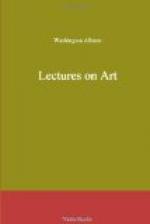Has human beauty, then, no power? When united with virtue and intellect, we might almost answer,—All power. It is the embodied harmony of the true poet; his visible Muse; the guardian angel of his better nature; the inspiring sibyl of his best affections, drawing him to her with a purifying charm, from the selfishness of the world, from poverty and neglect, from the low and base, nay, from his own frailty or vices:—for he cannot approach her with unhallowed thoughts, whom the unlettered and ignorant look up to with awe, as to one of a race above them; before whom the wisest and best bow down without abasement, and would bow in idolatry but for a higher reverence. No! there is no power like this of mortal birth. But against the antagonist moral, the human beauty of itself has no power, no self-sustaining life. While it panders to evil desires, then, indeed, there are few things may parallel its fearful might. But the unholy alliance must at last have an end. Look at it then, when the beautiful serpent has cast her slough.
Let us turn to it for a moment, and behold it in league with elegant accomplishments and a subtile intellect: how complete its triumph! If ever the soul may be said to be intoxicated, it is then, when it feels the full power of a beautiful, bad woman. The fabled enchantments of the East are less strange and wonder-working than the marvellous changes which her spell has wrought. For a time every thought seems bound to her will; the eternal eye of the conscience closes before her; the everlasting truths of right and wrong sleep at her bidding; nay, things most gross and abhorred become suddenly invested with a seeming purity: till the whole mind is hers, and the bewildered victim, drunk with her charms, calls evil good. Then, what may follow? Read the annals of crime; it will tell us what follows the broken spell,—broken by the first degrading theft, the first stroke of the dagger, or the first drop of poison. The felon’s eye turns upon the beautiful sorceress with loathing and abhorrence: an asp, a toad, is not more hateful! The story of Milwood has many counterparts.




